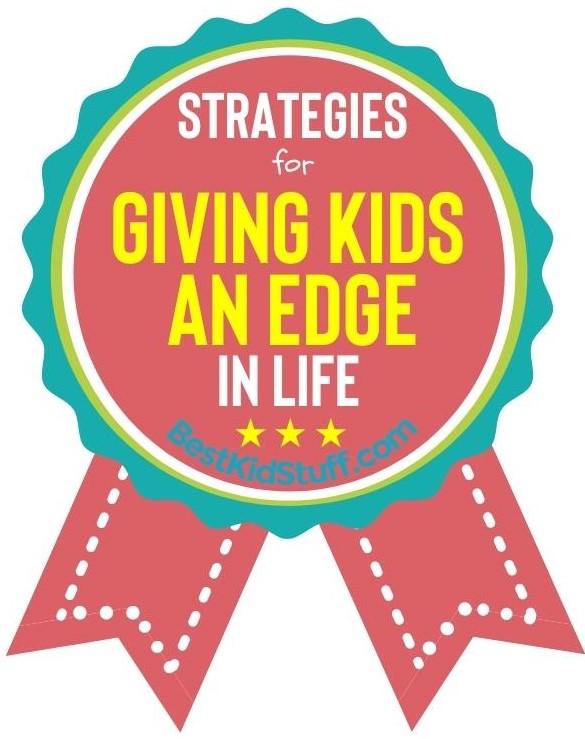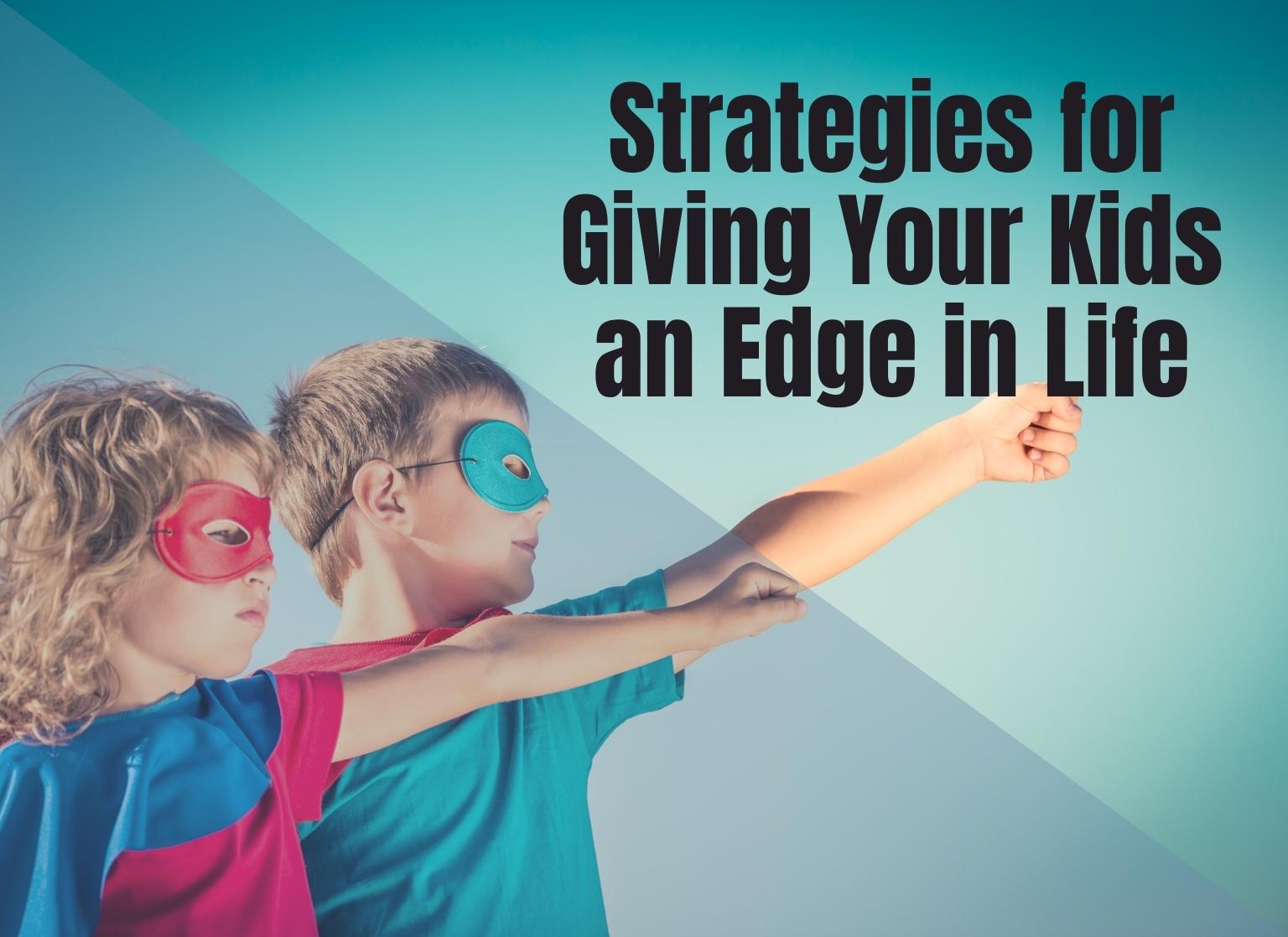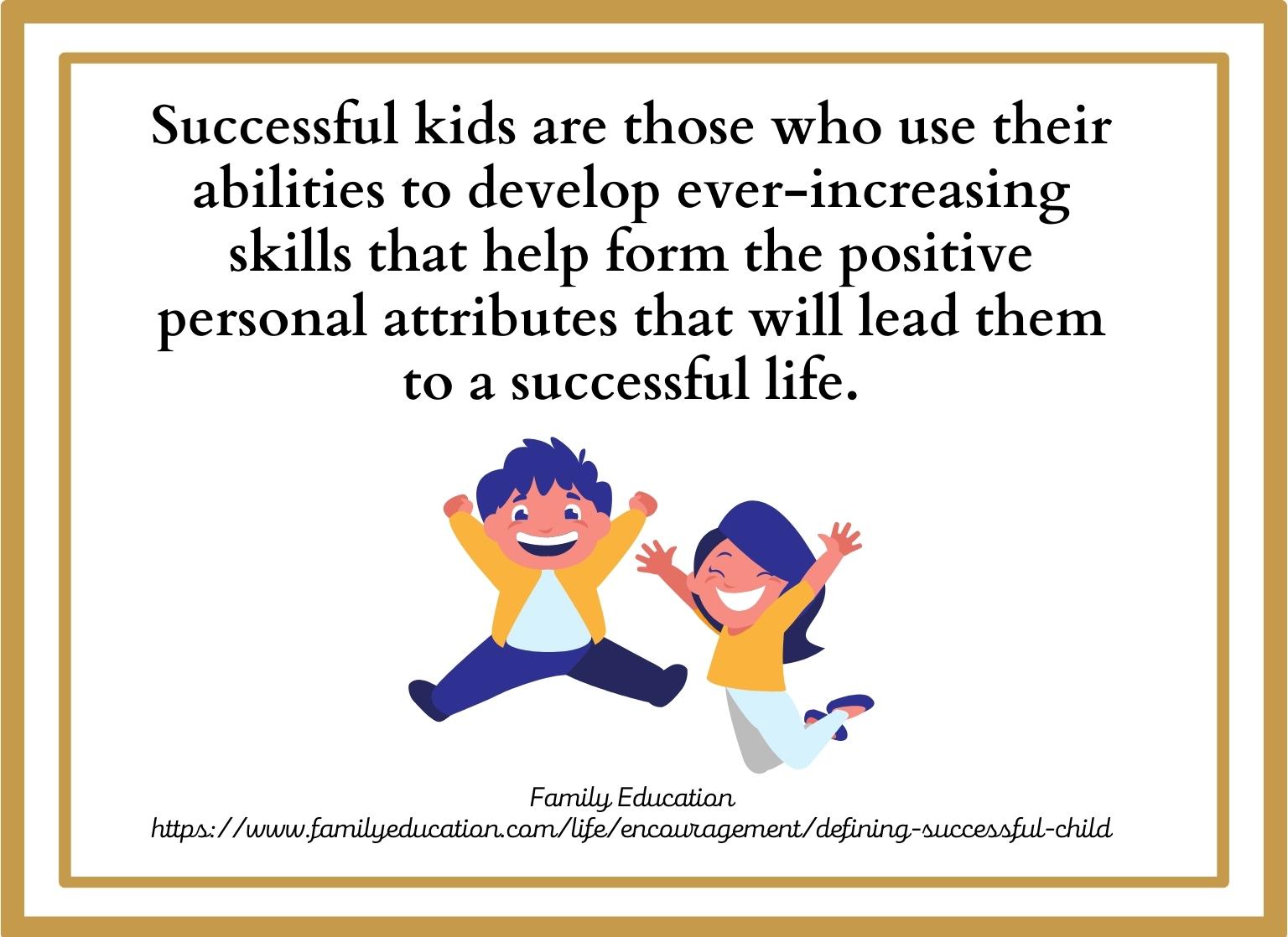
To paraphrase Aristotle, excellence is a habit – it’s neither a single act nor a series of acts that stops once a goal becomes a reality. This is also true with giving your kids an edge in life – it’s a habit that starts early in life and continues for a lifetime.
But an edge in life isn’t about providing your kids with material wealth and financial security, far from it. While financial security and the perks that come with it, such as a good education, a strong support system, and a wide network, are important, it isn’t a guarantee. As billionaires like Warren Buffett say, children should be given enough in life to do anything but not so much that they will do nothing.
Instead, an edge in life means the capacity to be happy in the face of life’s challenges, the resiliency to bounce back from failure, and the grit to achieve dreams. Confidence, courage and compassion, communication skills, drive and determination, and discipline are what sets apart children with an edge in life.
While nurturing these traits in your children seems like a tall order, it’s 100% possible when you make these ten strategies a daily habit. The key here is consistent application since children thrive on a fairly structured daily life. Remember that no strategy is superior to the others – every strategy influences the other strategies and, thus, these ten strategies must be applied holistically.

Encourage Open Communication Within the Family
Researchers at Harvard, MIT and UPenn discovered that children and parents who have frequent back-and-forth exchanges benefit from them. Children develop their effective communication skills crucial for their success in life, be it in their relationships or professional careers. Parents must communicate with their children based on their current language capacity and mental understanding while introducing new words, conversation skills and concepts.
While the child-parents communication can start as early as in the womb, the tri-university collaborative research suggests that the frequent back-and-forth exchanges may start as early as four years old. Back-and-forth exchanges are just that – children get to have a say in the conversations!
This isn’t just about talking to your children by giving them instructions about what and what not to do – “Hurry up!” “No, don’t do that!” or “Sit here and don’t touch anything!” This is about conversations where each takes turns talking and listening. This way, children know social cues, such as waiting for the other person to finish talking and sticking to the topic.
Children between four and six years of age already engage in simple conversations with adults on a wide range of topics. Ideally, parents should ask children about their specific interests, expand their knowledge and awareness of their environment, and show interest in their questions and answers.
Why the emphasis on open communication even in young children? Studies have shown that children with strong communication skills tend to have healthier and happier relationships, higher self-esteem and self-confidence, and better overall life satisfaction. Children who are skilled communicators are more likely to become great negotiators, too, which means getting more from life situations.
Researchers from the three prestigious universities found a scientific basis for the benefits of back-and-forth exchanges. Children who engage in the mutual exchanges exhibited more activity in the Broca’s area, an area in the brain where language processing and speech production occurs. They also scored higher in verbal reasoning, language, and grammar skills tests.
Indeed, it may well be the first evidence of the connection between family conversations and brain development in children! The frequent conversations also cement the bond between parents and their children that, in turn, strengthen their relationship. Children who have formed good relationships with their parents are more likely to be better in academics and relationships outside their homes.
The bottom line: Communicate with your children as often as possible! Not only will their communication skills become better, but they will also benefit from your attention, affection and guidance.
Let Your Kids Contribute to Family Life
We don’t mean in the financial sense! Instead, it’s about making them do their chores, listening to their inputs, and allowing them to participate in the decision-making process. These non-financial contributions bring numerous benefits, from developing their sense of responsibility to making them feel part of the family.
Making your children do their chores isn’t about making your life as parents easier, although it’s a bonus. Children also benefit from doing their chores because they learn essential life skills to serve them well when they become independent adults. Your children will learn to communicate and collaborate with their siblings, set goals and achieve them, and take pride in their accomplishments.
As they grow older, your children will also realize that they must do the work of life for them to be part of life. Household chores may be mundane, if not a bit burdensome, tasks, but these are necessary to enjoy life! Cooking meals means there’s food to nourish the body; cleaning the house means there’s space to enjoy daily activities, and doing the laundry means there are clothes to protect the body.
Of course, you must assign chores based on each child’s age, physical capacity and individual interests. Toddlers, for example, can start by picking up their toys and putting them in toy boxes. Pre-teens can assist in the kitchen by setting the table, cleaning up after meals and washing the dishes. Teens can cook meals and look after their younger siblings.
But while assigning chores is an effective way of teaching children about responsibility, you should also consider each child’s chore preferences. This is where their inputs come in – listen to what they have to say, compromise on the chore list, and adjust as needed. This applies to other decisions that your family must make as a unit, such as education and vacations since your children will be affected by them, too.
Remember that being an authoritative parent is the goal, neither a permissive nor an authoritarian parent. Your children will benefit from a home environment where they have a healthy respect for authority but don’t feel limited by it. Their self-esteem and self-confidence will be stronger for it, too, and these are two traits that give children an edge in life.
Children who do chores are also more likely to develop grit, a powerful personality trait that underlines success in individuals. Grit is known when done as a habit over a prolonged period and develops a commitment to said goal.
The bottom line: Let your children do chores! You will be surprised that it can be easier to encourage them to do their homework and study well, too.
Allow Your Children to be Kids
Playtime seems like children wasting time, doing silly things, and getting hot, dirty and sweaty! But playtime is crucial in their physical, mental and emotional health, a must for their overall development and essential for their future. Playtime encourages their creativity, develops their communication and collaboration skills, and makes them happier and healthier.
But playtime can be a challenge for many parents for many reasons, from the parents’ busy lifestyles to the enforced lockdowns due to the coronavirus. Playdates and structured play are becoming more popular, and these have an impact on children and their development. The drop in unstructured playtime may be partly responsible for decreasing mental and emotional development among children.
Studies have shown that unstructured play or playtime started and regulated by children on their own promotes physical, social, intellectual and emotional well-being. Children learn to share with others, work in groups, negotiate issues, and resolve conflicts by engaging in them. Children also learn to speak up for themselves and regulate their behavior, emotions and words.
A few tips for encouraging unstructured playtime:
- Let your children play on their own and make their own rules. There’s no need to enroll your children in structured sports, such as soccer or swimming, although they have merits. Playtime at home, both indoors and outdoors, is affordable yet just as effective.
- Avoid letting your children watch too much television and use too many gadgets, such as mobile phones and computers. Pediatricians recommend that infants and toddlers shouldn’t even look at digital screens for any time! Otherwise, their cognitive development becomes adversely affected. Studies have shown that kids exposed to television at a young age (and reasonably) are more likely to exhibit suppressed communication skills.
Parent-child communication is also affected by screen time! The better alternative is reading to your children and then discussing the book’s contents.
- Create opportunities for your children to play. Everyday activities can be turned into playtime with a little creativity, too! Think of shooting the laundry through a hoop and into a basket, taking your kids and dogs to the dog park, and raking the leaves into a large pile and jumping on it. Your children aren’t just doing their chores but also playing – and you’re a happier parent for it.
The bottom line: Let your children play! The sense of fun and humor they develop now will sustain them in adulthood, definitely an edge in life.
Teach Your Children Social Skills
No man is an island, and if you want your children to have an edge in life, you must teach them social skills that will allow them to become part of a community. This is backed by research, too, including a 20-year study conducted by Duke University and UPenn where more than 700 American children were tracked from kindergarten until their 25th year. The researchers discovered a substantial link between their social skills as kindergartners and their success in adulthood.
Specifically, children with competent social skills who cooperate and collaborate with their peers, demonstrate empathy for others, and resolve issues on their own have significantly higher chances for success as adults. Success meant earning a college degree and enjoying the perks of a full-time job by the age of 25.
Furthermore, kindergarteners with limited social skills were more likely to experience challenges in life as adults. These included binge drinking, getting arrested for crimes, and difficulty in getting approval for public housing. The study demonstrates that providing children with opportunities to develop their social and emotional skills is crucial to their healthy future.
What are these social skills? These include taking turns in conversations, sharing your resources like toys and food, and working with others to achieve a goal. These social skills aren’t learned in a single day, but when these skills are emphasized and practiced daily, these become part of your children’s personalities.
There’s no need to preach either, particularly as children don’t want to listen to words but keen on copying actions by adults. Being their role model is the best way to encourage them to learn their social skills in and outside of the home. Your children will observe your own social interactions with your partner, relatives and friends and take their cue from them.
You may also have to discuss the social interactions that your children see in other people on television and social media. Think of these situations as learning opportunities to expand their understanding of what’s acceptable and unacceptable in social interactions, both in-person and virtual.
Be sure to emphasize good manners with social skills, too. Toddlers can start by learning the proper usage of words like “Please,” “Thank you,” “You’re welcome,” and “Excuse me.” These aren’t just polite words but are crucial in making good impressions, establishing personal and professional networks, and cementing social bonds.
The bottom line: Your children will need effective social skills at every phase of their lives, and it’s best to start them as young as possible. Their social skills become their edge in life because of our interconnected society where no man is truly an island, even the introverts and hermits among us.

Teach Your Children to Develop and Maintain Good Relationships
Again, parents must become their children’s role models where good personal relationships are concerned. You and your partner must strive to demonstrate the characteristics of a good relationship – trust, respect and love are the most important of these characteristics. You will find that your children pick up your habits when talking, interacting and even fighting with your partner, and then apply them in their interactions.
While not every family has an ideal situation, parents must still strive to provide their children with as much stability as possible in their homes. Studies have shown that children in high-conflict family situations are more likely to be worse off than children whose parents get along. This is true for marriages that are intact for families with divorced parents.
Children exposed to conflict between their parents react negatively to the situation. But continued conflict after divorce strongly influences their ability to adjust to the new situation. Even in their adulthood, children who experienced a conflict-filled divorce still reported distress over it, even experiencing strong feelings of regret, loss, and anguish.
In two-parent homes, parents who face their conflict and fight fair in the presence of their children are more likely to provide them with a sense of stability. You must demonstrate compromise, support and calmness even when it’s a struggle because your children are watching and listening – and learning, too!
When your kids witness your conflicts being handled like reasonable adults, they learn better social skills, become more emotionally secure, and build self-confidence. Your children also learn that it’s possible to resolve conflicts constructively, aside from the security that their parents are willing to work out their differences.
What’s the point of these demonstrations? Just as charity begins at home, so does building good relationships! With a happy and healthy marriage or co-parenting arrangement with an ex, your children will also enjoy a healthy and happy family. This is an edge in life that both anecdotal and scientific evidence agrees on.
The bottom line: Show your children what it takes to create and sustain good relationships within your family, both in words and actions. Their edge in life will manifest as a willingness to work for good relationships with others while also valuing themselves enough to walk away from a toxic or abusive relationship.
Set High Educational Expectations
Before setting high educational expectations for your children, you must present yourself as a worthy role model. If you haven’t earned a college degree, you must work toward earning it. You must also show drive and determination to earn it so your children can become inspired by your example.
Science backs it, too, with studies that show parents who achieved higher educational levels were more likely to encourage their kids to pursue higher education. Even parents who envisioned their children’s future as college graduates managed to achieve their goals regardless of their educational level and socioeconomic status. Indeed, aspiration plays an instrumental role in giving your children an edge, perhaps even more vital than a privileged upbringing.
Setting high educational expectations for your children has a psychological effect, too, known as the Pygmalion effect. This means that one person’s expectations of another become a self-fulfilling prophecy. Your expectations as a parent play a huge role in your children’s attainment of their goals.
But to live up to your educational expectations and academic potential, you must create both the conducive environment and the wide range of opportunities necessary for their attainment.
- Start on their math skills as early as possible. Your children’s mastery of fundamental math concepts, from numbers to shapes, will not only determine their future math achievement but their future reading achievement, too. You don’t even have to enroll them in special math programs either – start by introducing math concepts at home through toys, books and activities. You may enroll them in special math programs or with math tutors when they are older, say, starting from middle school.
- Read to your children early on in life, too! Reading isn’t just about quality time but also about boosting your children’s language and literacy skills, as well as facilitating their cognitive development. Be sure to read to them from a wide range of topics with a mix of the familiar and new.
Children’s books are obvious choices, but you can also read from literary classics, contemporary volumes, and even encyclopedias. The trick is choosing books that will arouse their interest, hold their attention, and make them curious. You should also ask for their suggestions when your children are old enough to express them.
Place toys and books for math mastery and reading pleasure around your home. Your children will be more inspired to pick up a book instead of a digital gadget if it’s readily available.
- Set consistent yet realistic expectations that your children are aware of and motivated to work hard to achieve. Establishing effective study habits early, perhaps since first grade, is a must, too. But don’t forget, too, that as much as academic achievements are an edge in life, so are social skills, emotional stability and physical health. Playtime must be balanced with study time!
The bottom line is to give your children access to good educational opportunities and support them in their academic endeavors. The recognitions are the icing on the cake – the cake itself is the edge your children get in life.
Let Your Children Try, Fail and Succeed
Failure is an event, not the person! This is a mindset that parents should encourage in their children, whether it’s getting up after falling on the playground or rising above personal setbacks. Failure happens to everybody, but it doesn’t have to be permanent in their lives.
This is also known as the growth mindset, a stark contrast to the scarcity of a fixed mindset. You can teach children that failure is an opportunity to learn from your mistakes and grow. Failure is neither the end nor the ending, and, as such, there are always second chances and room for improvement.
While allowing your children to fail seems contradictory to setting high expectations for them, it isn’t! By letting them try on their own, falling flat on their face, and getting back on their feet, your children gain life skills that enable them to meet your high expectations. These life skills include grit and a go-getter mindset, which are essential in any situation, from achieving excellent grades to getting top jobs, even working on a personal relationship.
Parents who have successful children also emphasize effort in achieving goals over avoiding failure and the attainment of perfection. If you’re a tiger or helicopter parent, you may want to back down from your relentless efforts at perfection! Studies have shown that the overemphasis on achievement can increase the risk of depression, substance abuse and anxiety in children.
The bottom line: Letting your children fail on their own isn’t letting them down! Giving them the skills and opportunity to overcome failure is more important.
Strengthen Your Children’s Work Ethic and Pride in Their Work
This is where assigning chores to children and giving them opportunities to achieve your high educational goals come in! Children who become engaged in the work of life develop their work ethic early and strengthen it as they grow older. Your children learn the value of working hard, contributing to the family, and even earning money with small tasks done for neighbors.
As your children achieve their goals, whether in their household chores or academics, you should encourage their sense of pride in their achievements. You can praise their efforts, too, even when these don’t meet your initial expectations. Your feedback for what can be done for better results, mixed with your praise for their effort, is the key to their edge in life.
There’s nothing wrong with constructive criticism, too, but make sure that you’re careful with your choice of words and actions! As mentioned previously, you must focus on the positive aspects and provide possible solutions while also praising their efforts.
Be careful, too, about praising your children for everything and anything! This is akin to toxic positivity in that it creates the mindset that your children can do nothing wrong. The sense of entitlement it creates will be your children’s onus in life, not their edge.
You should also let your children make decisions to grow into independent adults. You should exercise parental control over certain aspects of your children’s lives, particularly their health, safety and security.
But there are other aspects that your children can take charge of! Your children may, for example, choose their clothes, school supplies, and food, perhaps even their time for homework. As they grow older, you can give them more leeway to make major life decisions and take control of their lives.
The bottom line: As adults, your children will seek out relationships where their opinions and decisions are valued. If you didn’t allow them to make their own decisions as children, they could become co-dependent adults whose relationships are characterized by power and control being held by others. This isn’t an edge in life – it’s a gateway to abuse in its various forms!
Nurture Your Children’s Emotional Intelligence
Like the other personality traits vital for an edge in life, emotional intelligence isn’t an inborn trait; it’s a skill that can be nurtured in children! While some children seem to be born with a calm, contented and cool disposition, it isn’t guaranteed later in adulthood. Parents must then nurture their children’s emotional intelligence regardless of their natural inclination.
What’s emotional intelligence in the first place? This is the ability to understand your emotions, regulate your reactions to upsetting situations, and empathize with others. Emotional intelligence is an edge in life because of its crucial importance in creating and sustaining healthy relationships, both personally and professionally.
Think about it: Family and friends, clients and employers, and the community, in general, prefer an individual with a handle on their emotions. Relationships aren’t the only ones at stake – money and lives may also be on the line!
Psychologists recommend using a three-step process when teaching emotional intelligence in children, particularly when they are struggling with frustration, anger and disappointment.
- Empathize with your children when they feel negative emotions against you or other persons.
- Label their specific emotions, particularly by aiding them in describing what they are feeling and how their feelings affect them.
- Validate their feelings and work out possible solutions in dealing with whatever issue is at hand.
But remember that while you should tell your children that their feelings are normal given the circumstances, you cannot tolerate bad behavior.
Teaching your children optimism is also essential in nurturing their emotional intelligence. Optimism is also a learned skill that enables individuals to look on the bright side while looking for solutions. Children and teens with an optimistic attitude tend to be happier and more successful in school, athletics, and work. Their risks for depression and anxiety are also lower due to their effective coping mechanisms against the pressures of life.
Encourage Self-Discipline in Your Children
Have you heard of the marshmallow test? Children were presented with marshmallows and given a choice between immediately eating the sweet treats and waiting for a minute with a prize at the end. The children who chose delayed gratification were found to lead better lives and healthier and happier than the children who chose instant gratification as adults.
Indeed, the consistent exercise of self-discipline is considered the most influential determinant in life success! Children who delay gratification in anticipation of better results through a strong will are more likely to enjoy success in school, in the playground, and at home. Self-discipline also enables children to cope better with life stressors, from academics to personal relationships.
Teaching self-discipline also starts with modeling behavior, and it starts with you! Leading a healthy lifestyle through a good diet, exercise and lifestyle habits, working toward your goals consistently, and adopting good money habits are great examples. There’s no need to perform the marshmallow test either since many temptations can turn into learning opportunities for self-discipline and self-control.
The bottom line: Children whose parents demonstrate self-discipline and self-control tend to exercise these traits, too. These traits underline nearly every trait that gives children an edge in life, from their solid work ethic to emotional intelligence.
In conclusion, there’s no complete list of strategies that will give your children an edge in life, but this list is a great start. You must consider the individuality of each of your children and adjust these tips accordingly. In the end, your children’s uniqueness is an edge in itself – your job as a parent is to nurture your children’s talents so that they can achieve their fullest potential. The rest is up to your children.








